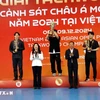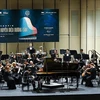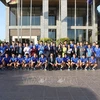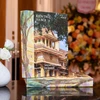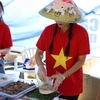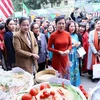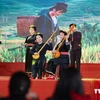German film maker Gunter Giesenfeld, who has had a strong attachment to Vietnam since the antiwar movements of the 1960s, is now working hard to introduce the Southeast Asian nation’s literature to German readers.
As a professional film maker, he first started producing documentary films about Vietnam in 1972, then he translated poems and books from Vietnamese into German and published a magazine in Germany about Vietnam’s literature.
Giesenfeld is now chairman of the Germany-Vietnam Friendship Association and has held the position for more than 10 years. Giesenfeld and others who took part in the antiwar movement in Germany set up the friendship association in 1976.
As a close friend of Vietnam for several decades, Professor Giesenfeld is now in Hanoi as the guest of the Vietnam Union of Friendship Associations to take part in the celebrations marking he 35th anniversary of the war ending in Vietnam.
He recalled his youth, when he and other Germans held street protests against the US war in Vietnam.
“I realised that many Germans had joined the movement driven by an anti-US spirit and some of them didn’t really know much about Vietnam.
“Since then I began to learn more about Vietnam’s culture and history, as well as Laos and Cambodia,” he said.
In 1972, he worked with colleagues in the ancient city of Hue to make a film about the Pentagon’s psychological war plans.
He first came to Vietnam in 1976 and since then has made films featuring the country’s agriculture, cooperatives, Agent Orange and its culture including water puppetry.
Some of the films were broadcast on German television or screened during education or friendship programmes with Vietnam .
Giesenfeld also paid special attention to Vietnam’s history and literature. He translated and edited a number of books, including poems by Che Lan Vien, Nguyen Dinh Thi who are well-known Vietnamese poets and also his friends.
He recently joined a project to translate the first set of books by Nguyen Huy Thiep into the German language and they have received a positive response from German readers. He will continue working on books by Nguyen Huy Thiep and Le Minh Khue.
From 2000, Giesenfeld, in his capacity as Chairman of the Germany-Vietnam Friendship Association, started to publish the magazine Vietnam Kurier, which focuses on the country’s literature and is issued three times a year.
“It’s interesting that those who are interested in the magazine are not only the association’s members but are also from other circles. Our magazine is a specialised publication on Vietnamese literature in Germany.”
Giesenfeld, now over 70, still keeps a close watch on Vietnam’s development and is happy when talking about the country. He is interested in discussing Vietnam’s pressing socio-economic issues and its struggle between consumerism and preserving traditional cultural values.
“Vietnam is always changing, even from only a month a go,” he said, adding that is the thing he found most interesting about the country./.
As a professional film maker, he first started producing documentary films about Vietnam in 1972, then he translated poems and books from Vietnamese into German and published a magazine in Germany about Vietnam’s literature.
Giesenfeld is now chairman of the Germany-Vietnam Friendship Association and has held the position for more than 10 years. Giesenfeld and others who took part in the antiwar movement in Germany set up the friendship association in 1976.
As a close friend of Vietnam for several decades, Professor Giesenfeld is now in Hanoi as the guest of the Vietnam Union of Friendship Associations to take part in the celebrations marking he 35th anniversary of the war ending in Vietnam.
He recalled his youth, when he and other Germans held street protests against the US war in Vietnam.
“I realised that many Germans had joined the movement driven by an anti-US spirit and some of them didn’t really know much about Vietnam.
“Since then I began to learn more about Vietnam’s culture and history, as well as Laos and Cambodia,” he said.
In 1972, he worked with colleagues in the ancient city of Hue to make a film about the Pentagon’s psychological war plans.
He first came to Vietnam in 1976 and since then has made films featuring the country’s agriculture, cooperatives, Agent Orange and its culture including water puppetry.
Some of the films were broadcast on German television or screened during education or friendship programmes with Vietnam .
Giesenfeld also paid special attention to Vietnam’s history and literature. He translated and edited a number of books, including poems by Che Lan Vien, Nguyen Dinh Thi who are well-known Vietnamese poets and also his friends.
He recently joined a project to translate the first set of books by Nguyen Huy Thiep into the German language and they have received a positive response from German readers. He will continue working on books by Nguyen Huy Thiep and Le Minh Khue.
From 2000, Giesenfeld, in his capacity as Chairman of the Germany-Vietnam Friendship Association, started to publish the magazine Vietnam Kurier, which focuses on the country’s literature and is issued three times a year.
“It’s interesting that those who are interested in the magazine are not only the association’s members but are also from other circles. Our magazine is a specialised publication on Vietnamese literature in Germany.”
Giesenfeld, now over 70, still keeps a close watch on Vietnam’s development and is happy when talking about the country. He is interested in discussing Vietnam’s pressing socio-economic issues and its struggle between consumerism and preserving traditional cultural values.
“Vietnam is always changing, even from only a month a go,” he said, adding that is the thing he found most interesting about the country./.












